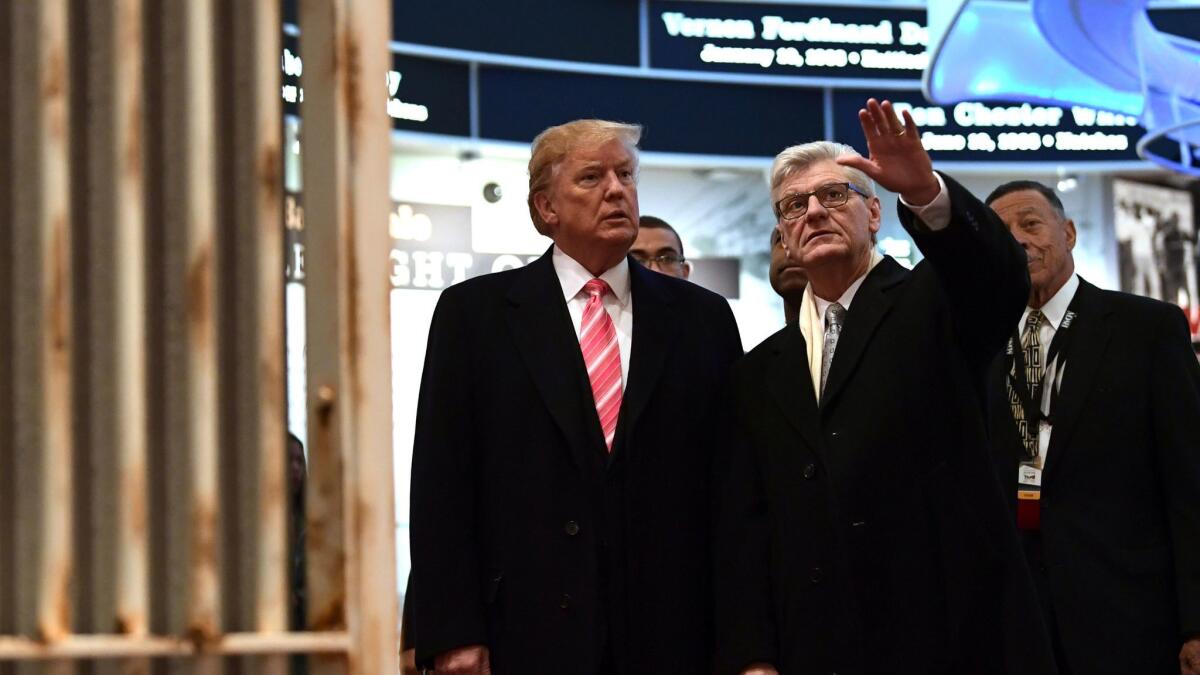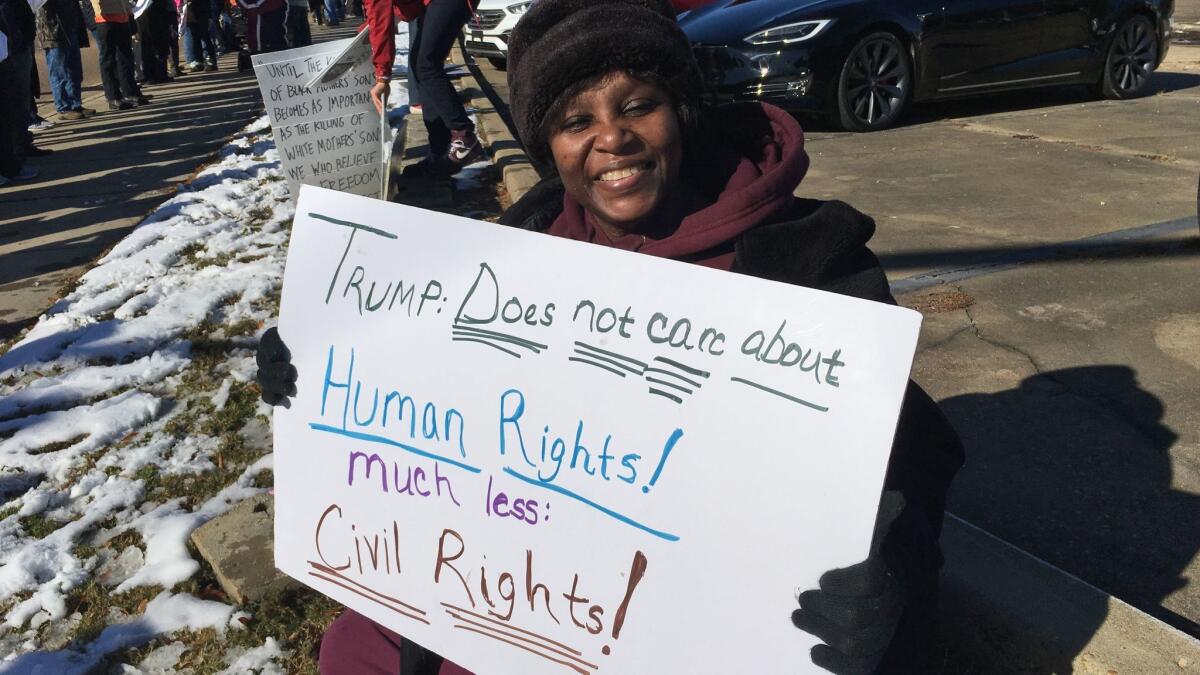âMr. President, we donât need you in Mississippi.â Protests as Trump speaks at new civil rights museum

JACKSON, Miss. â President Trump made a brief visit to Mississippiâs capital on Saturday to attend the opening of a new civil rights museum as his presence sparked a boycott by lawmakers, civil rights icons and protesters who questioned his commitment to racial equality.
âTrump does not care about human rights! Much less: civil rights!â and âMake America Civil Againâ read some signs as about 200 protesters gathered outside the Mississippi Civil Rights Museum in downtown Jackson.
The building, which along with a companion state history museum opened at a cost $90 million, is the first state-owned civil rights museum in the nation. It launched as Americans grapple with growing racial divisions that many activists blame Trump for fueling.
Its kickoff, which had the support of a broad coalition of civil rights veterans and politicians from across the U.S., became overshadowed by the controversy over Trump in recent days as a growing number of civil rights figures announced plans to stay away.
They included Rep. John Lewis, a Georgia Democrat who was a major civil rights activist; Rep. Bennie Thompson; former Gov. Ray Mabus and Jackson Mayor Chokwe Antar Lumumba. They also included members of the National Assn. for the Advancement of Colored People, whose national president cited Trumpâs âabysmalâ civil rights record in calling for him to skip the event.
âMr. President, we donât need you in Mississippi to tell us what a civil rights movement is about,â said Lumumba, who gathered with activists at an African American history center about a mile west of the opening to condemn Trumpâs arrival.
âWe do not respect your attitude and your division of this nation. We do not respect your xenophobia. We do not respect your denial of the fact that black people are to be respected for their worth, dignity and rights,â San Francisco NAACP branch President the Rev. Amos Brown, who grew up in Jackson, said as he stood by Lumumba.
Trump did not heed their calls.
Charles Evers, the brother of slain civil rights activist Medgar Evers, greeted the president on the tarmac before he spent less than an hour at the museum. U.S. Housing and Urban Development Secretary Ben Carson joined Trump.
Mississippi Gov. Phil Bryant, who invited Trump to visit, and Reuben Anderson, the stateâs first black Supreme Court justice, gave the two a brief tour that included an exhibit on the Freedom Riders who rode public transit to challenge illegal segregation. The museum dives into the history of the civil rights movement in the state between 1945 and the 1970s, including major national turning points such as the brutal murder of Emmett Till outside Money, Miss., in 1955.
Trump stayed largely on script as he spoke for about nine minutes to an invitation-only crowd of 200 museum donors, civil rights figures, and local and state officials in an auditorium. Event organizers initially expected Trump to speak at a larger outdoor public event before the White House said his presence would be more limited in what appeared to be a concession to protesters.
âThese buildings embody the hope that has lived in the hearts of every American for generations. The hope for a future that is more just and is more free,â Trump said. He mentioned the âthe fight to end slavery, to break down Jim Crow, to end segregation, to gain the right to vote, and to achieve the sacred birthright of equality.
âThatâs big stuff. Those are very big phrases. Very big words. Here we memorialize the brave men and women who struggled to sacrifice, and sacrifice so much, so that others might live in freedom,â Trump said.
The president called Martin Luther King Jr. âa man who I studied and watched, admired for my entire life.â He recalled the work of Medgar Evers, who âfought in Normandy in the second world warâ and then battled âgrave injustices against very innocent people.â A white supremacist murdered the activist in Jackson in 1963. Eversâ widow, Myrlie Evers-Williams, received a standing ovation as Trump recognized her by name.
In contrast to the majority-black city and nearly all-black crowd of more than 1,000 people who had gathered at the outdoor ceremony, the group Trump addressed was mostly white.
âThereâs not a lot of black people here,â said John Perkins, an 87-year-old Jackson resident and veteran of the civil rights movement who sat in the front row of the auditorium with his daughter, Joanie Potter, next to a seat reserved for Bryant.
âFor me personally, itâs like an Ebenezer, a new beginning. And I hope this can be symbolic of a time for reconciliation. ⌠It was a âheart searchingâ for me to come here after the president was coming, but I decided itâs too important. We got to do it together.â
Perkins stood for the president as he entered and exited. But his daughter, who came with her husband and two sisters, did not. âHeâs up there saying the right thing, but look at what he is doing against everything the museum stands for,â Potter said.
âEw,â she said, describing her reaction to Trumpâs words.
Afterward at the public event outside, speakers largely avoided references to the controversy over Trump. âToday, we are being challenged almost as much as when Medgar Evers was alive,â said Evers-Williams, who spoke at length to praise the museums.

Trump has repeatedly stumbled with race and faced challenges that he enables racism through his tweets, statements and policies. He opened his presidential campaign by calling Mexican immigrants criminals and ârapists,â and later promised to ban all Muslims from entering the U.S.
Athletes have accused the president of picking racially charged fights with black sports stars whom he mocks for kneeling during the national anthem to protest police brutality. Republicans came out against Trump after he suggested neo-Nazis at a deadly march in Charlottesville, Va., included âvery fine people.â Federal courts have repeatedly knocked down his travel ban for illegally targeting Muslims, though the Supreme Court recently revived it.
His standing among minorities has also suffered. A new Quinnipiac University poll found that 57% of Americans said Trump did not respect racial minorities as much as white people. The poll found that 86% of African Americans hold that view.
White House spokesman Raj Shah pushed back against the protests and accusations of racism.
âItâs a little unfortunate that a moment like this, that could be used for unification and bringing people together, some folks are choosing to play politics with it,â Shah said.
Trump has âalways condemned racism, violence and bigotry and hatred in all forms,â Shah added.
Philemon Williams, a black Jackson resident and Trump supporter who wore a âMake America Great Againâ shirt to the opening, agreed.
âWe need him. Heâs our president. We got to give him respect. I donât have no problem with him,â said Williams, 51. âThere are racists here and everywhere, but thatâs not his fault.â
But Nicki Nichols, a 34-year-old white Jackson resident, said she did not believe the president was sincere in his condemnations. She joined demonstrators outside the museum security perimeter, some of whom took to their knees to support the anti-racism protests ignited by former San Francisco 49ers quarterback Colin Kaepernick.
âThe position of the president of the United States is generally regarded as a respectable individual who strives to ensure the safety and security of the nation, and its citizens,â Nichols said. âDonald Trump has consistently failed to live up these standards and has also repeatedly chosen to use his position to belittle not only those whose values he does not support, but to belittle American citizens.â
Jaweed Kaleem is The Timesâ national race and justice correspondent. Follow him on Twitter, Facebook and Instagram.
UPDATES:
5:20 p.m.: This article was updated throughout with details of Trumpâs visit and reaction from attendees at the museum opening.
This article was originally published at 10:05 a.m.
More to Read
Sign up for Essential California
The most important California stories and recommendations in your inbox every morning.
You may occasionally receive promotional content from the Los Angeles Times.











